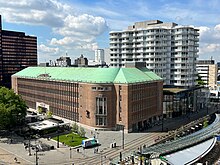Rotterdamsche Bank

The Rotterdamsche Bank, known from 1911 to 1947 as Rotterdamsche Bankvereeniging or Robaver,[1] was a significant bank in the Netherlands, founded in 1863. In 1964, it merged with Amsterdamsche Bank to form AMRO Bank (for AMsterdamsche & ROtterdamsche).[2]
Overview
The Rotterdamsche Bank was established on 16 May 1863 by a group of businessmen and bankers, who took inspiration from the British Colonial Bank and aimed at financing trade and investment in the Dutch East Indies. After a difficult start, however, the bank soon focused on domestic business.[3]
Between 1911 and 1947 it was known as the Union Bank of Rotterdam (Dutch: Rotterdamsche Bank Vereeniging, abbreviated as Robaver), following its 1911 acquisition of Rotterdam competitor Deposito- en Administratie Bank (est. 1900) and soon afterwards of Amsterdam brokers Determeijer Weslingh & Zn. (est. 1765). Under the leadership of its ambitious managing director Willem Westerman, it went on to acquire a number of local banks,[4] but became overextended and had to be restructured under the aegis of De Nederlandsche Bank in the mid-1920s. In 1928, it created the Vrouwenbank ("Women's Bank"), a bank targeted at a female customer base that lasted until 1971.[4]
In 1960, Rotterdamsche Bank acquired Nationale Handelsbank, a major former colonial bank that had been known until 1950 as the Dutch-Indian Trade Bank (Dutch: Nederlandsch-Indische Handelsbank, NIHB; est. 1863).[3]
- Pre-World War II Rotterdamsche Bank head office on the Boompjes waterfront thoroughfare, ca. 1905
- Branch on Rokin in Amsterdam, 1979 (demolished since then)
- Former branch building at Kneuterdijk 8, The Hague
See also
References
- ^ a b "Rotterdamsche Bank". Post-war reconstruction Community Rotterdam.
- ^ "Bigness Sought by Dutch Banks; Merger of 4 Units Into Two Aimed at Competition". New York Times. 6 July 1964.
- ^ a b ABN AMRO Historisch Archief, Rotterdamsche Bank, 1863-1964 (PDF)
- ^ a b "Our History". ABN Amro.

![Pre-World War II Rotterdamsche Bank head office on the Boompjes [nl] waterfront thoroughfare, ca. 1905](https://upload.wikimedia.org/wikipedia/commons/thumb/7/75/De_Rotterdamsche_Bank_bij_de_Boompjes_1903_-_1907.jpg/86px-De_Rotterdamsche_Bank_bij_de_Boompjes_1903_-_1907.jpg)


![Former branch building [nl] in Gouda](https://upload.wikimedia.org/wikipedia/commons/thumb/3/3b/Rotterdamsche_Bank_Oosthaven_Gouda.jpg/120px-Rotterdamsche_Bank_Oosthaven_Gouda.jpg)